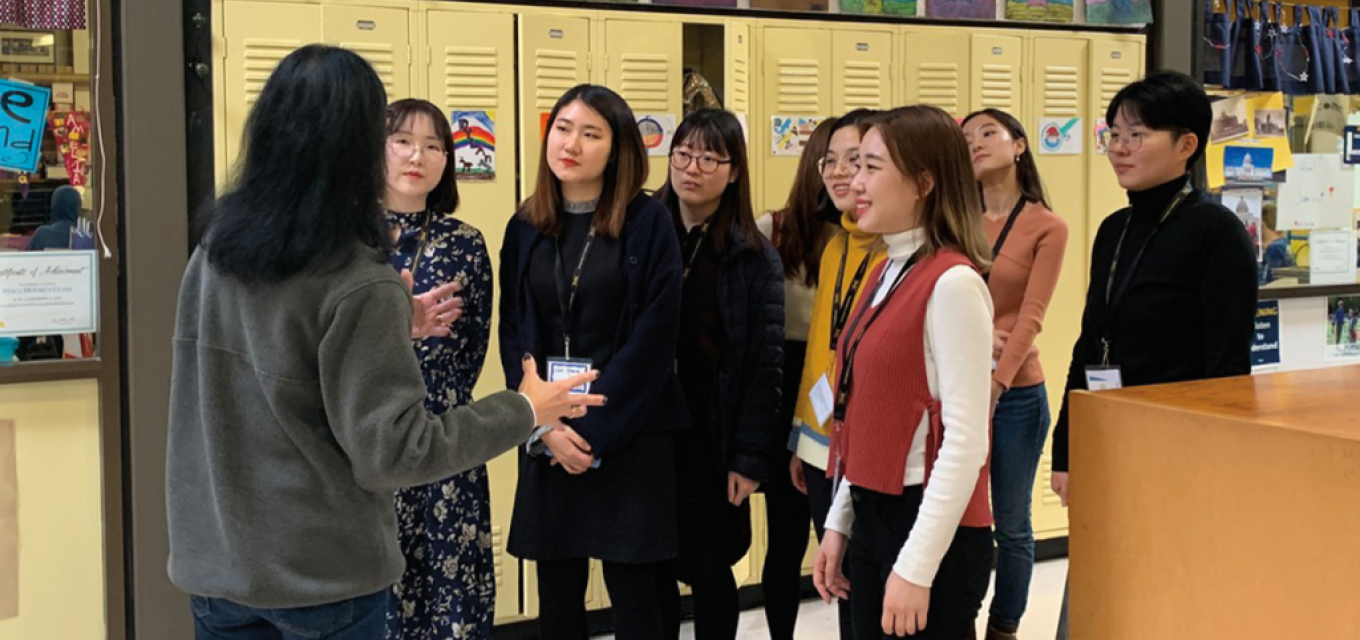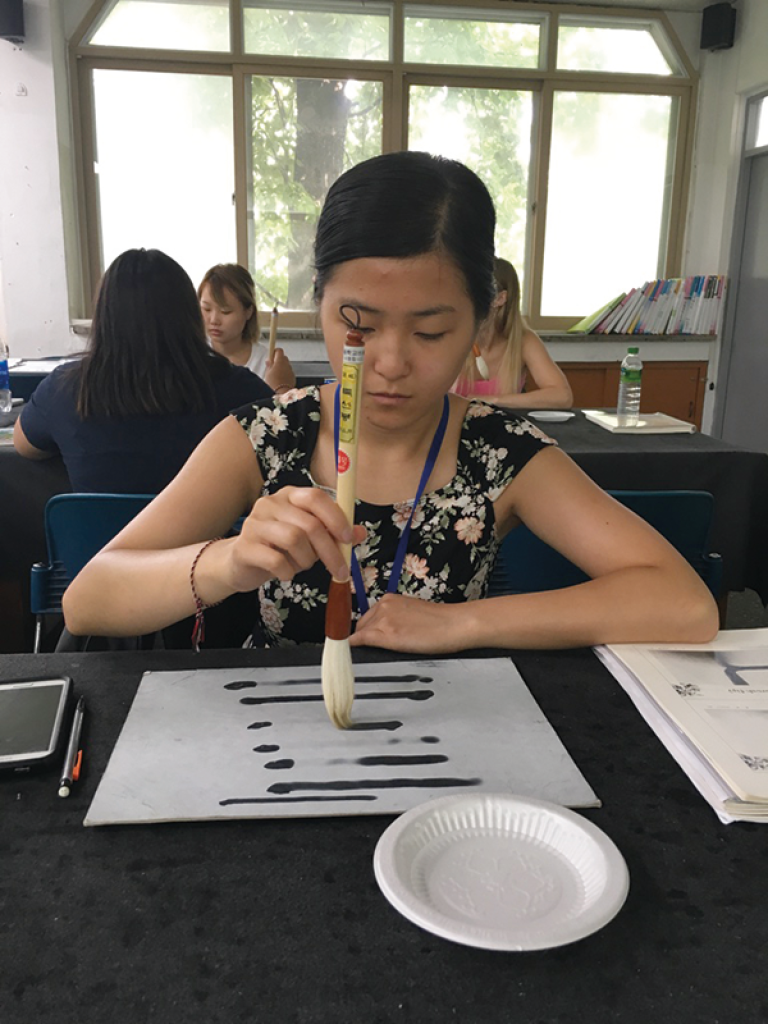2021 Fall

A decade of learning across borders
CEHD and Seoul National University of Education mark 10 years of collaboration.
Ten years ago, CEHD and the Seoul National University of Education (SNUE) in South Korea tried out a new program. SNUE was interested in sending teacher candidates to the United States for professional development. That initial trial run turned out to be a great success and spun off into a decade-long partnership between CEHD and SNUE with multiple programs.
“We thought it was a great opportunity,” says Department of Organizational Leadership, Policy, and Development Associate Professor Christopher Johnstone. Johnstone was CEHD’s director of international initiatives and relations at the time and was instrumental in getting the initial project, the Global Teacher Education Program (GTEP), off the ground. “The idea would be for SNUE students to come for about a month to get a couple of weeks of classroom-based higher education lessons and then spend time in Twin Cities’ area schools,” he says.
The program was unique in that it was not focused on English language development, which many U.S. programs for international students are, but rather on enhancing teaching skills and exposure to innovative teaching theories and methods. “This turned out to be a very successful model and we have hosted hundreds of SNUE students in the past 10 years,” says International Initiatives Program Director Marina Aleixo, who helped design the original curriculum and now facilitates the program.
Helping facilitate the program on SNUE’s end was Kyung-Sung Kim, who was the dean of international affairs and in charge of official relations with other universities. Later, he served as president of SNUE from 2015 to 2019. “The main value of this partnership is the extension of the global mind about the mutual understanding of different cultures for University of Minnesota and SNUE students. Usually, the lack of that could make some trouble socially,” he says, adding that he is pleased the partnership has lasted so long. “Ten years is a long time to be sustained in a rapidly changing world, but we’ve tried our best to continue this partnership,” he says.
SNUE Professor Jungmin Kwon came to Minnesota with GTEP students in January 2017 and said that learning about different school systems helped them look at the Korean system from a more critical point of view. “By that I mean Korean elementary school curriculum is quite rigid because it is controlled by the federal government. They were able to try out different things that they could not try in Korea, which helped them gain a wider perspective on education and learning.” And as students, they learned a lot about campus life and American culture in general.

Kwon says she also gained valuable insights from the experience. “I learned the importance of school’s space design,” she says. “And how the design of the space and curriculum affect each other.”
SNUE student Insil Jeon already had an interest in how education systems operate in different countries, so she was excited when she discovered GTEP in 2013. “I thought it would be interesting to consider the comparison between the U.S. and South Korea,” she says. “I wanted the chance to apply the pedagogical skills I had attained through SNUE’s teacher training program and continue my professional development with the assistance of the GTEP program.”
During the first part of the program, she learned about the American education systems, including literacy education, ESL/EFL pedagogical approaches, and private versus public school systems. “The second half of the program included being placed in an elementary school in Minneapolis where I observed actual American classrooms and got to see the implementation of those approaches I had learned throughout the first half of the program,” she says. “I also organized and taught three of my own lessons, which were interdisciplinary, involving music and history.”
Jeon is now a PhD student at CEHD, studying immigrant and refugee student education in South Korea. She also is a research assistant for the Office of International Initiatives, investigating the long-term effectiveness of GTEP by communicating with past participants who are now mostly in-service teachers in the Seoul area.
As the GTEP program proved to be successful, SNUE and CEHD looked for more opportunities to collaborate and build a more reciprocal partnership. “We expanded our relationship to include a year-long SNUE student exchange and a U of M study abroad in Seoul,” Aleixo says.
The study abroad program, launched in 2014, is called Taste of South Korea: Culture, Language, and Education. “The program is managed by SNUE and all workshops and teaching in Korea are led by SNUE faculty and staff,” Aleixo says.
In this three-week course, small groups of U of M students stay at the SNUE campus and learn about different aspects of Korean culture, particularly the historical background of the educational system and its impact on current social, political, and educational policies.
As a CEHD student, Grace Nelson enrolled in the program in 2015 and says she was amazed by all the things she learned. “They taught us how the education system worked and it gave me a really interesting perspective about education in America versus education in Korea,” she says. “Actually, what it led me to do was become a teacher here in South Korea. I am currently teaching and living in Daejeon, South Korea. SNUE and the Taste of Korea program just kind of sparked that interest.”
“SNUE and CEHD are both educational leaders and have much to learn from each other.”
Jungmin Lee, now a senior at SNUE, was a volunteer who helped the Minnesota students with their schedules and showed them around Seoul to try to make their stay more comfortable. “I got close with the students during the program and decided to apply for the exchange program to continue the relationship,” Lee says.
She was an exchange student January to December 2019 in Minnesota. “Spending a year on my own in a foreign country was intimidating at first, but I found out I could do much more than I thought I was capable of,” Lee says. “I was amazed at the scope and variety of courses that the U offered, ranging from American politics to scuba diving. I deliberately took courses that were outside of my major, like global studies, public speaking, self-defense, and so on. Such a wide spectrum of courses offered by the U was an opportunity for me to examine different views and develop a wider perspective.”
She says her stay in Minnesota was punctuated with unexpected challenges, like trying and failing to cook some of her favorite Korean dishes, worrying about where to live when her lease ended, and missing her family and friends a Pacific Ocean away. “At the same time, I got to make new friends who genuinely cared for me,” she says. Lee says she is grateful for all the relationships and memories she made during her program, a common refrain from most everyone who has been a part of the decade-long CEHD-SNUE relationship.
“The strength and sustainability of this partnership lies on respect, trust, and balanced reciprocity,” explains Aleixo. “SNUE and CEHD are both educational leaders and have much to learn from each other. This collaboration provides a space for knowledge exchange and intellectual growth.”
Indeed, the partnership is an integral part of CEHD’s internationalization efforts. “The decade-long relationship with SNUE highlights the potential of international partnerships to integrate into our college, University, and local community,” says Aleixo.
Photos courtesy of Marina Aleixo, International Initiatives
-Kevin Moe